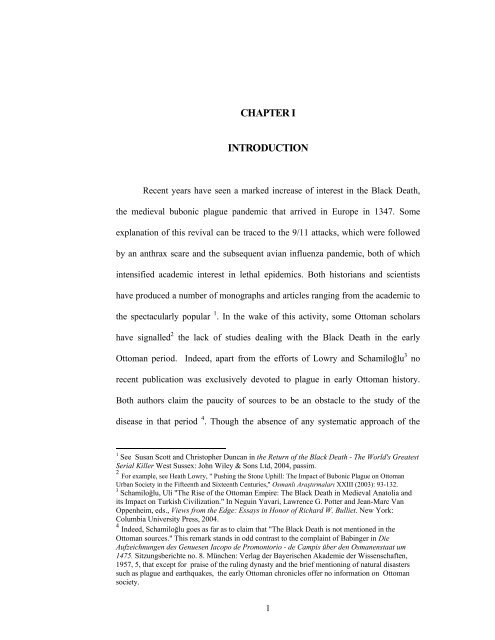the black death in early ottoman territories - Bilkent University
the black death in early ottoman territories - Bilkent University
the black death in early ottoman territories - Bilkent University
Create successful ePaper yourself
Turn your PDF publications into a flip-book with our unique Google optimized e-Paper software.
CHAPTER I<br />
INTRODUCTION<br />
Recent years have seen a marked <strong>in</strong>crease of <strong>in</strong>terest <strong>in</strong> <strong>the</strong> Black Death,<br />
<strong>the</strong> medieval bubonic plague pandemic that arrived <strong>in</strong> Europe <strong>in</strong> 1347. Some<br />
explanation of this revival can be traced to <strong>the</strong> 9/11 attacks, which were followed<br />
by an anthrax scare and <strong>the</strong> subsequent avian <strong>in</strong>fluenza pandemic, both of which<br />
<strong>in</strong>tensified academic <strong>in</strong>terest <strong>in</strong> lethal epidemics. Both historians and scientists<br />
have produced a number of monographs and articles rang<strong>in</strong>g from <strong>the</strong> academic to<br />
<strong>the</strong> spectacularly popular 1 . In <strong>the</strong> wake of this activity, some Ottoman scholars<br />
have signalled 2 <strong>the</strong> lack of studies deal<strong>in</strong>g with <strong>the</strong> Black Death <strong>in</strong> <strong>the</strong> <strong>early</strong><br />
Ottoman period. Indeed, apart from <strong>the</strong> efforts of Lowry and Schamiloğlu 3 no<br />
recent publication was exclusively devoted to plague <strong>in</strong> <strong>early</strong> Ottoman history.<br />
Both authors claim <strong>the</strong> paucity of sources to be an obstacle to <strong>the</strong> study of <strong>the</strong><br />
disease <strong>in</strong> that period 4 . Though <strong>the</strong> absence of any systematic approach of <strong>the</strong><br />
1 See Susan Scott and Christopher Duncan <strong>in</strong> <strong>the</strong> Return of <strong>the</strong> Black Death - The World's Greatest<br />
Serial Killer West Sussex: John Wiley & Sons Ltd, 2004, passim.<br />
2 For example, see Heath Lowry, " Push<strong>in</strong>g <strong>the</strong> Stone Uphill: The Impact of Bubonic Plague on Ottoman<br />
Urban Society <strong>in</strong> <strong>the</strong> Fifteenth and Sixteenth Centuries," Osmanlı Araştırmaları XXIII (2003): 93-132.<br />
3 Schamiloğlu, Uli "The Rise of <strong>the</strong> Ottoman Empire: The Black Death <strong>in</strong> Medieval Anatolia and<br />
its Impact on Turkish Civilization." In Negu<strong>in</strong> Yavari, Lawrence G. Potter and Jean-Marc Van<br />
Oppenheim, eds., Views from <strong>the</strong> Edge: Essays <strong>in</strong> Honor of Richard W. Bulliet. New York:<br />
Columbia <strong>University</strong> Press, 2004.<br />
4 Indeed, Schamiloğlu goes as far as to claim that "The Black Death is not mentioned <strong>in</strong> <strong>the</strong><br />
Ottoman sources." This remark stands <strong>in</strong> odd contrast to <strong>the</strong> compla<strong>in</strong>t of Bab<strong>in</strong>ger <strong>in</strong> Die<br />
Aufzeichnungen des Genuesen Iacopo de Promontorio - de Campis über den Osmanenstaat um<br />
1475. Sitzungsberichte no. 8. München: Verlag der Bayerischen Akademie der Wissenschaften,<br />
1957, 5, that except for praise of <strong>the</strong> rul<strong>in</strong>g dynasty and <strong>the</strong> brief mention<strong>in</strong>g of natural disasters<br />
such as plague and earthquakes, <strong>the</strong> <strong>early</strong> Ottoman chronicles offer no <strong>in</strong>formation on Ottoman<br />
society.<br />
1
















